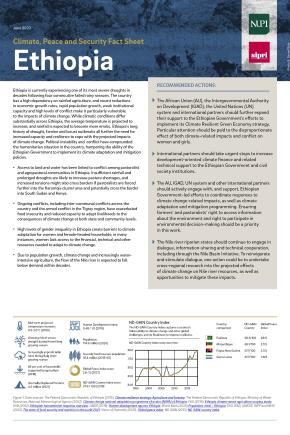Climate, Peace and Security Fact Sheet: Ethiopia (2022)

Ethiopia is currently experiencing one of its most severe droughts in decades following four consecutive failed rainy seasons. The country has a high dependency on rainfed agriculture, and recent reductions in economic growth rates, rapid population growth, weak institutional capacity and high levels of conflict make it particularly vulnerable to the impacts of climate change. While climatic conditions differ substantially across Ethiopia, the average temperature is projected to increase, and rainfall is expected to become more erratic. Ethiopia's long history of drought, famine and locust outbreaks all further the need for increased capacity and resilience to cope with the projected impacts of climate change. Political instability and conflict have compounded the humanitarian situation in the country, hampering the ability of the Ethiopian Government to implement its climate adaptation and mitigation policies.



